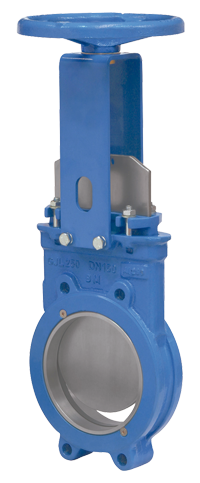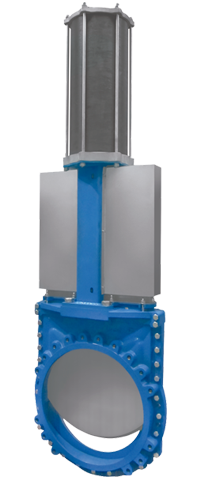BIDIRECTIONAL KNIFE GATE VALVES
Bidirectional knife gate valves are flow control devices that can be used in piping systems to stop flow in both directions. These valves are designed with a knife-edge blade or plate that is lowered to block fluid flow when the valve is closed.
Bidirectional knife gate valves are commonly used in industrial applications to control the flow of liquids and solids such as water, sewage, sludge, paper pulp, chemicals and food. They can be operated manually, hydraulically or pneumatically and can be designed to handle high pressures and temperatures.
Bidirectional knife gate valves are especially useful in applications where fluid flow is irregular or needs to be stopped completely in both directions, such as in water and wastewater treatment systems, food and beverage manufacturing processes and bulk material conveying systems.

EB Model
Bidirectional wafer style knife gate valve for general industrial and water applications
The EB model knife gate is a bi-directional valve designed for general industrial service applications. The design of the body and seat assures non-clogging shutoff on suspended solids in industries such as:
- Wastewater treatment plants
- Chemical plants
- Food and Beverage
- etc.
Sizes:
DN 50 to DN 1200 (larger diameters on request)
Working pressure:
- DN 50 to DN 125: 16 bar
- DN 150 to DN 250: 10 bar
- DN 300 to DN 400: 6 bar
- DN 450: 5 bar
- DN 500 to DN 600: 4 bar
- DN 700 to DN 1200: 2 bar
Standard flange connection:
EN1092 PN10
Other flange connection (on request):
EN558-1 serie20 (DIN3202 K1) up to DN 500.
EB MODEL DATA SHEET (EN)

HB Model
Bidirectional high pressure wafer style knife gate valve for general industrial and water applications
The HB model knife gate is a bi-directional valve designed for general industrial service applications. The design of the body and seat assures non-clogging shutoff on suspended solids in industries such as:
- Wastewater treatment plants
- Chemical plants
- Food and Beverage
- etc.
Sizes:
DN 80 to DN 600 (larger diameters on request)
Working pressure:
DN 80 to DN 600: 16 / 20 bar
Standard flange connection:
EN 1092 PN 16 and ASME B16.5 (class 150)
Other flange connection on request
Face to face dimensions ACC.:
EN558-1 serie20 (DIN3202 K1)
HB MODEL DATA SHEET (EN)

BR Model
Bidirectional wafer style knife gate valve with stainless steel rings for general industrial applications
The BR model knife gate is a bi-directional valve designed for general industrial service applications. The design of the body and seat assures non-clogging shut off on suspended solids in industries such as:
- Pulp and Paper
- Wastewater Treatment Plants
- Food and Beverage
- Power plants
- Mining
- Chemical plants
- Etc.
Sizes:
DN 50 to DN 600mm (larger diameters on request)
Working pressure:
- DN 50 to DN 250: 10 bar
- DN 300 to DN 400: 6 bar
- DN 450: 5 bar
- DN 500 to DN 600: 4 bar
Standard flange connection:
DIN PN 10
ASME B16.5 (class 150)
BR MODEL DATA SHEET (EN)

BX Model
Bidirectional wafer style knife gate valve for coal burner isolation
The BX model knife gate is a bi-directional wafer valve specifically designed for the isolation of pulverized coal burner lines on coal fired boilers during maintenance. The valve is dust tight which makes it suitable for other bulk handling applications, such as silo outlet valves. This valve has been designed for use in potentially explosive areas (ATEX) and it complies with DIN EN 14460 (Explosion resistant equipment). In the closed position, the valve can be used as an effective measure against flame propagation in the event of an explosion.
Sizes:
DN 700 to DN 1000 (Smaller and larger diameters on request).
Working pressure:
DN 700 to DN 1000: 3 bar
Standard flanges connection:
DIN PN 10
DIN EN 14460:
(DN 700-1000)Valve housing resistance to explosion pressure and ignition disrupting resistance against St1 dust explosion in closed position:
DN700-800: 9,6 bar
DN900-1000:10,5 bar
*IMPORTANT: Pressure rating of the valve refers to maximum working pressure of the valve. The maximum explosion pressure exceeds many times the working pressure, so 94/9/EC limits must always be observed.